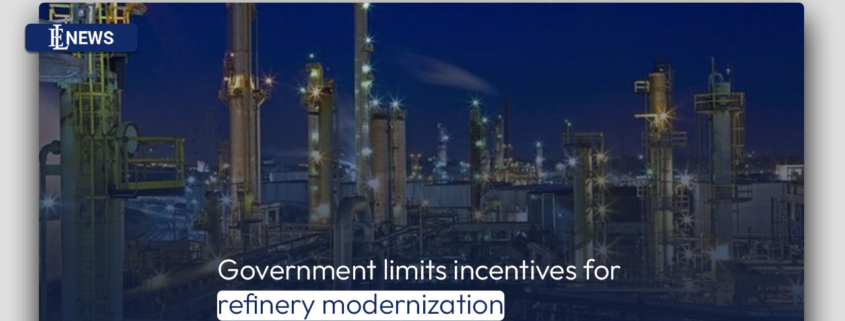Government limits incentives for refinery modernization
ISLAMABAD: The federal government has changed the incentives in the just-approved brownfield refining policy, capping the usage of monies to be received through tariff protection at 22% for the import of used refining equipment and 25% for new equipment to modernize infrastructure.
Read more with EL news: Review of Warsak Dam safety
This month, the outgoing administration approved a new policy that will allow existing refineries to import machinery duty-free in order to increase production of Euro-5 quality fuels, which is projected to reduce the need for imported fuel.
The Cabinet Secretariat has instructed the Ministry of Energy’s Petroleum Division to change several incentives, according to a notification it has issued. For refineries importing used plant, machinery, and equipment (PME) for upgrading, there will be a cap of 22 percent on funding from an escrow account, and a cap of 25 percent for those importing new PME.
On imported petrol and diesel, the program stipulates a minimum customs duty of 10% for a six-year term. Any customs duty exceeding 10% that is included in the ex-refinery price—the price at which refineries sell fuel—will be deposited in the Inland Freight Equalization Margin (IFEM), which is used to equitably distribute the cost of petroleum products across the nation.
Under the new strategy, petrol and diesel prices could increase, and refineries are anticipated to become more ecologically friendly
The revised policy stated that “for a period of six years from the date of notification of the refining policy and opening of the joint escrow account with the Oil and Gas Regulatory Authority (Ogra), refineries shall be allowed a 10 percent tariff protection/deemed duty applicable on motor petrol (petrol) and diesel’s ex-refinery price.”
However, “refineries shall deposit by refineries in the escrow account maintained by Ogra and the respective refinery jointly in the National Bank of Pakistan for the utilization of upgrade projects only, 2.5pc of the deemed duty on diesel and 10pc of motor petrol (incremental incentive).”
Price rises of Rs5.64 for petrol and Rs3.07 for diesel are anticipated as a result of this strategy, while actual price increases may vary depending on the state of the market. However, this will assist in converting the current refineries to deep conversion facilities that meet Euro-5 standards at an estimated cost of $4 billion for each one. This represents a significant cost savings compared to the $10 billion needed to build a new (greenfield), comparable refinery, maximize gasoline and diesel production, and drastically cut furnace oil output.
Within three months, an Ogra refinery will open the required escrow account. The incremental incentive will be deposited in the IFEM up until the account is opened. Imported new machinery and supplies for refinery renovations won’t be subject to certain taxes and levies. However, after finishing the preliminary design study for the upgrade, a refinery must submit the equipment specifics for approval to the Federal Board of Revenue in order to qualify for these tax advantages.
A refinery must also sign a legally binding upgrade project agreement with Ogra within three months to be eligible for these advantages.
The proposed milestone deliverables with timelines, such as feasibility, front-end engineering design, financial close, engineering, procurement and construction contract, and commissioning, as well as the potential configuration, such as unit and size, and tentative product slate after upgrading, are all described in this agreement.
This upgrade’s anticipated dramatic reduction in furnace oil output, which would make these refineries more ecologically friendly, is a noteworthy feature.
For instance, the production of petrol at the Parco refinery would grow under the agreement from 3,700 to 5,500 tonnes per day and that of diesel from 5,600 to 8,100 tons per day. In comparison, its production of furnace oil will decrease from 3,300 tons per day to just 212 tons.
Refineries including Attock Refinery Ltd, National Refinery Ltd, Pakistan Refinery Ltd, and Cnergyico are anticipated to experience nearly comparable benefits.
Until a legally valid and enforceable settlement is struck with the government, any refinery that is in arrears on government levies or dues will not be qualified for these incentives.
Based on the final investment decision (FID), Ogra will permit the withdrawal of a maximum of 25 percent of the refineries renovation project cost. There will be no responsibility on the government or Ogra to make up the difference if the money placed in the joint escrow account are less than 25% of the sum spent on a milestone or the entire project.
Money from the escrow account may be withdrawn in accordance with project milestones when the improvement project has been financially completed. A maximum of 25% from the escrow account and 75% from the refinery’s own resources will be released from the joint escrow account on a pro rata basis. Internationally recognized firms will audit the accounting to ensure accountability and transparency.
Last but not least, the policy permits refineries that enter into an upgrade agreement with Ogra to continue manufacturing and selling their current products that fall short of Euro-5 standards until the upgrade’s anticipated completion date, which must occur within six years. The waiver will end at that point.
Six months from now, refineries that do not sign an agreement with Ogra will not be granted a waiver and will be forbidden from creating and distributing goods that do not adhere to Euro-5 standards.



